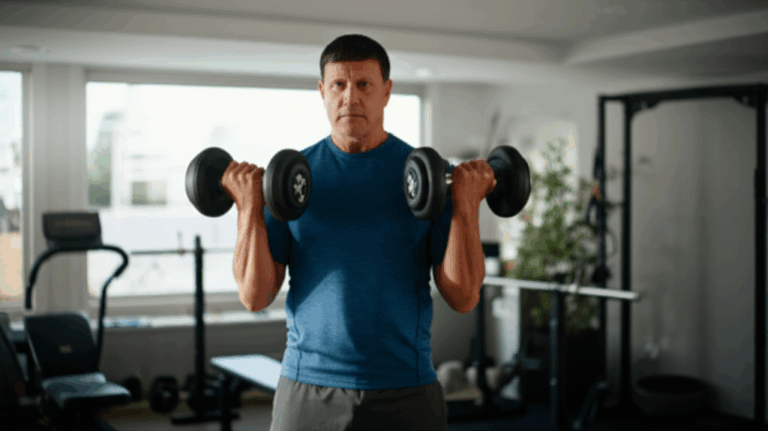Turning 50 is a significant milestone, and it’s the perfect time for men to prioritize their health and fitness. Staying strong and healthy after 50 is achievable with the right strategies. This guide provides practical tips on building strength, maintaining overall health, and enjoying an active lifestyle.
Why Fitness Matters After 50
Maintaining good health becomes crucial as men age. Several factors make fitness after 50 particularly important:
- Slowing Metabolism: Metabolism naturally slows down, making it easier to gain weight. Regular exercise and a balanced diet can combat this.
- Muscle Loss: Men naturally lose muscle mass as they age, which can lead to decreased strength and mobility. Strength training is essential to counteract this loss.
- Increased Health Risks: The risk of chronic diseases such as heart disease, diabetes, and certain cancers increases with age. A healthy lifestyle can significantly reduce these risks.
- Mental Well-being: Mental health is as important as physical health. Staying active and fit can boost mood, reduce stress, and improve cognitive function.
Setting Realistic Goals
Before diving into a fitness routine, it’s important to set achievable goals. Consider these steps:
- Consult a Doctor: Before starting any new exercise program, consult with a healthcare provider. They can assess your current health status and provide personalized recommendations.
- Assess Current Fitness Level: Understand your current fitness level to set realistic goals. This might involve evaluating your strength, endurance, flexibility, and balance.
- Define Specific Goals: Set specific, measurable, achievable, relevant, and time-bound (SMART) goals. Examples include:
- Losing a certain amount of weight in a specific timeframe.
- Increasing the number of repetitions for strength training exercises.
- Improving cardiovascular endurance by walking or swimming for a set duration.
- Be Patient: Fitness is a journey, not a destination. Understand that progress takes time, and it’s okay to start slowly and gradually increase intensity.
Exercise Strategies for Men Over 50
1. Strength Training
Strength training is vital for men over 50. It helps maintain and build muscle mass, improves bone density, and boosts metabolism.
Benefits of Strength Training:
- Combats muscle loss (sarcopenia).
- Increases bone density, reducing the risk of osteoporosis.
- Improves balance and coordination, preventing falls.
- Boosts metabolism, aiding in weight management.
- Enhances overall strength and physical function.
Effective Exercises:
- Squats: Strengthen legs and core. Use bodyweight, box squats, or goblet squats.
- Push-ups: Work chest, shoulders, and triceps. Start with knee push-ups if needed.
- Rows: Target back muscles. Use dumbbells or resistance bands. Bent-over barbell rows are also effective.
- Overhead Press: Strengthen shoulders and upper back. Use dumbbells or a resistance band.
- Deadlifts: Work multiple muscle groups. Focus on maintaining proper form.
- Lunges: Improve leg strength and balance.
- Planks: Strengthen core muscles.
Training Guidelines:
- Aim for at least two to three strength training sessions per week.
- Prioritize form over load to prevent injuries.
- Use moderate to heavy weights that allow you to complete 8-12 repetitions per set.
- Incorporate full-body sessions rather than isolating individual muscle groups.
- Balance pushing exercises with pulling exercises for shoulder health.
2. Cardiovascular Exercise
Cardio is essential for heart health, weight management, and overall endurance.
Benefits of Cardio:
- Improves cardiovascular health, reducing the risk of heart disease.
- Helps maintain a healthy weight.
- Boosts energy levels.
- Reduces stress and improves mood.
- Enhances sleep quality.
Effective Exercises:
- Brisk Walking: A simple and accessible option.
- Swimming: Low-impact and excellent for overall fitness.
- Cycling: Good for leg strength and endurance.
- Dancing: Fun and effective for cardiovascular health.
- Hiking: Great for outdoor activity and endurance.
- Water Aerobics: Gentle on the joints.
Training Guidelines:
- Aim for at least 150 minutes of moderate-intensity aerobic exercise per week.
- Alternatively, aim for 75 minutes of vigorous-intensity aerobic exercise per week.
- Incorporate activities you enjoy to stay consistent.
- Break up your cardio into shorter sessions if needed.
- Consider high-intensity interval training (HIIT) for shorter, more effective workouts.
3. Flexibility and Balance Training
Flexibility and balance exercises are crucial for maintaining mobility, preventing falls, and reducing the risk of injuries.
Benefits of Flexibility and Balance Training:
- Improves range of motion and joint health.
- Enhances balance and stability, preventing falls.
- Reduces muscle soreness and tension.
- Promotes relaxation and reduces stress.
- Supports overall mobility and physical function.
Effective Exercises:
- Stretching: Include static and dynamic stretches, and hold each stretch for 20-30 seconds.
- Yoga: Improves flexibility, strength, and balance.
- Tai Chi: Gentle movements that enhance balance and coordination.
- Pilates: Strengthens core muscles and improves flexibility.
- Balance Exercises: Stand on one leg, use a balance board, or try heel-to-toe walking.
- Thoracic Wall Slides: Stretches back and spine.
Training Guidelines:
- Incorporate flexibility and balance exercises into your routine several times a week.
- Focus on proper form and controlled movements.
- Consider joining a class for guidance and motivation.
Nutrition for Men Over 50
1. Balanced Diet
A balanced diet is essential for maintaining health and supporting your fitness goals. Focus on the following:
- Fruits and Vegetables: Aim for at least five servings per day. They provide essential vitamins, minerals, and antioxidants.
- Lean Proteins: Include fish, poultry, eggs, legumes, soy products, and lean meats in your diet. Protein is crucial for maintaining muscle mass. Aim for 20-30 grams of protein with each meal.
- Whole Grains: Choose whole grain carbohydrates such as oats, brown rice, quinoa, and whole wheat bread. They provide sustained energy and fiber.
- Healthy Fats: Incorporate sources of healthy fats such as extra-virgin olive oil, avocados, nuts, and seeds.
- Limit Processed Foods, Sugary Drinks, and Excessive Alcohol: These can contribute to weight gain and increase the risk of chronic diseases.
2. Hydration
Staying hydrated is crucial for overall health and fitness. As men age, the thirst response may decrease, so it’s important to consciously drink water throughout the day.
Benefits of Hydration:
- Supports digestion and metabolism.
- Regulates body temperature.
- Lubricates joints.
- Aids in nutrient absorption.
- Promotes prostate health.
Hydration Tips:
- Drink water with every meal.
- Carry a water bottle and sip throughout the day.
- Drink before, during, and after exercise.
- Add lemon or berries for flavor.
- Limit sugary drinks.
3. Essential Nutrients
Men over 50 have specific nutritional needs to maintain optimal health.
- Fiber: Aim for 30 grams of dietary fiber per day from sources such as whole grains, fruits, vegetables, beans, and lentils.
- Potassium: Include potassium-rich foods such as greens, mushrooms, peas, tomatoes, oranges, raisins, dates, low-fat milk, yogurt, and fish.
- Calcium and Vitamin D: These are essential for bone health. Consume dairy products, leafy greens, and fortified foods. Talk to your doctor about vitamin D supplements.
- Omega-3 Fatty Acids: Found in fish, vegetable oils, and nuts. They support heart health and brain function.
4. Weight Management
Maintaining a healthy weight is crucial for reducing the risk of chronic diseases.
- Tips for Weight Management:
- Eat mindfully and slowly.
- Control portion sizes.
- Avoid processed foods and refined sugars.
- Incorporate regular physical activity into your routine.
- Consider intermittent fasting.
- Be aware of hunger and fullness levels.
Mental Health and Well-being
Mental health is an integral part of overall health. Men over 50 may face unique challenges that can impact their emotional well-being.
Common Challenges:
- Retirement transition.
- Changes in physical health.
- Loss of loved ones.
- Social isolation.
Strategies for Mental Well-being:
- Stay socially active.
- Challenge your mind with puzzles, reading, or learning new skills.
- Practice mindfulness, breathing exercises, or relaxation techniques.
- Engage in regular physical activity.
- Seek advice from peers who have faced similar challenges.
- Consider joining clubs or groups to stay connected.
Common Health Concerns for Men Over 50
1. Prostate Health
Prostate issues become more common with age. Regular screenings are essential.
- Recommendations:
- Schedule annual prostate screenings.
- Stay physically active.
- Make healthy lifestyle decisions.
- Manage stress.
- Limit red meat consumption.
- Eat more fruits and vegetables.
2. Heart Health
Heart disease is a leading cause of death for men over 50.
- Recommendations:
- Maintain a healthy weight.
- Exercise regularly.
- Eat a heart-healthy diet.
- Control blood pressure and cholesterol levels.
- Quit smoking.
- Minimize alcohol and caffeine intake.
3. Mental Health
Mental health conditions such as depression and anxiety can significantly impact quality of life.
- Recommendations:
- Stay socially connected.
- Engage in mentally stimulating activities.
- Practice stress-reduction techniques.
- Seek professional help if needed.
4. Other Health Concerns
- Diabetes: Manage blood sugar levels through diet and exercise.
- Low Testosterone: Consult with your doctor about potential treatments.
- Sleep Disorders: Aim for 7-9 hours of quality sleep each night.
- Cancer Screenings: Stay up-to-date with recommended cancer screenings.
Injury Prevention
1. Common Injuries
Older adults are at a higher risk of certain exercise-related injuries.
- Common Injuries:
- Overuse injuries (e.g., tennis elbow, tendonitis).
- Stress fractures.
- Lower back pain.
- Rotator cuff tears.
- Meniscus tears.
2. Prevention Strategies
- Warm-up Properly: Prepare your muscles for exercise with a thorough warm-up.
- Use Proper Form: Maintain correct form during exercises to avoid strain.
- Listen to Your Body: Pay attention to pain and stop if you feel discomfort.
- Gradually Increase Intensity: Avoid doing too much too soon.
- Stay Flexible: Incorporate stretching exercises into your routine.
- Use Safe Equipment: Ensure equipment is in good condition and familiar.
- Cool Down: End your workout with a cool-down period.
- Consider Working with a Professional: A personal trainer or physical therapist can provide guidance and ensure you are exercising safely.
Supplements for Men Over 50
1. Essential Supplements
- Multivitamin: Bridges nutritional gaps and supports overall health. Look for one designed specifically for men over 50.
- Vitamin D: Supports bone health, immune function, and testosterone production.
- Omega-3 Fatty Acids: Crucial for heart health, brain function, and reducing inflammation.
- Magnesium: Supports muscle function, nerve transmission, and energy production.
- Calcium: Works with vitamin D to keep bones strong.
2. Other Supplements to Consider
- Vitamin B12: Important for nerve function, energy metabolism, and cognitive health.
- Zinc: Essential for healthy body function and testosterone production.
- DHEA: May increase blood testosterone levels.
- Beetroot Juice: Can increase levels of nitric oxide, improving blood flow and exercise performance.
- Saw Palmetto: May help with prostate issues.
3. Important Considerations
- Consult with your doctor before taking any supplements.
- Not all supplements are created equal; choose high-quality products.
- Supplements should complement a healthy diet, not replace it.
- Be aware of potential interactions with medications.
Making it a Lifestyle
Staying fit and healthy after 50 is about making sustainable lifestyle changes.
- Consistency is Key: Regular exercise and a healthy diet are more important than occasional intense efforts.
- Find Activities You Enjoy: Choose activities that you find enjoyable to stay motivated.
- Make it Social: Exercise with friends or join a class for added motivation and support.
- Track Your Progress: Monitor your progress to stay motivated and make adjustments as needed.
- Celebrate Successes: Acknowledge and celebrate your achievements, no matter how small.
- Be Patient and Persistent: There will be ups and downs, but stay committed to your goals.
- Prioritize Sleep: Aim for 7-9 hours of quality sleep each night.
- Manage Stress: Practice relaxation techniques and prioritize downtime.
- Stay Hydrated: Drink plenty of water throughout the day.
- Quit Bad Habits: Cut out smoking and limit alcohol consumption.
By incorporating these strategies into your daily life, men over 50 can build strength, maintain health, and enjoy an active, fulfilling lifestyle. Remember, it’s never too late to start, and small changes can make a big difference.







